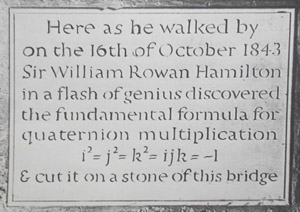i2=j2=k2=ijk=-1.

Moltiplicare per un nr complesso ruota e dilata il piano.
una moltiplicazione di triple per ruotare e dilatare lo spazio.
Ma non ci riusci' poiche'
E' un caso particolare per n=2 che
ruotare e dilatare nello spazio nD richiede n numeri.
Anni dopo ne scrisse a suo figlio ora adulto:
Every morning in the early part of the above-cited month, on my coming down to breakfast, your (then) little brother William Edwin, and yourself, used to ask me, "Well, Papa, can you multiply triplets?" Whereto I was always obliged to reply, with a sad shake of the head: "No, I can only add and subtract them."
Hamilton was walking with his wife along the Royal Canal in Dublin:
And here there dawned on me the notion that we must admit, in some sense, a fourth dimension of space for the purpose of calculating with triples ... An electric circuit seemed to close, and a spark flashed forth.
| In a famous act of mathematical vandalism, Hamilton carved the
formula for multiplying what he later called quaternions into the
wall of Broome Bridge, over the Canal. It read:
i2=j2=k2=ijk=-1.
|
 |
Hamilton scopri' come i quaternioni possono ruotare e dilatare lo spazio 3D, e cio' li caratterizza
i quaternioni sono cio' che serve per
fare allo spazio 3D cio' che i nr complessi fanno a se' nello spazio 2D
quaternions are the things needed
to do to 3D space what complex numbers are able to do for themselves in 2D
space!
Le rotazioni nello spazio 3D non commutano, e quindi
Cosi' e' per i quaternioni.
I quaternioni divennero molto popolari, e libri furono scritti.
Poi gli studiosi trovarono altri modi di fare le stesse cose
I quaternionisti persero la battaglia di Pubbliche Relazioni,
e la gente dei vettori vettori vinse
Un tempo
invece ora
Sebbene Hamilton fosse orgoglioso dei quaternioni, non e' cio' per cui oggi e' ricordato.
Invece la sua "hamiltoniana" (un modo di usare l'energia di un sistema per derivare tutto cio' che ne consegue) e' ancor oggi costantemente usata.
Ma i quaternioni hanno perso il loro favore, e cio' rende piuttosto commovente che Hamilton spese il resto della sua vita lavorandoci sopra e scrivendo libri di testo sul loro uso e utilita' in fisica.
"Quaternions came from Hamilton after his really good work had been done, and though beautifully ingenious, have been an unmixed evil to those who have touched them in any way" - Lord Kelvin.
"But," says Baez, "the Hamiltonian is very much still used, so you don't need to feel sorry for him."
L'idea di inventare un nuovo sistema numerico catturò l'immaginazione del tempo, e avviò una mania, specialmente in Irlanda, di saltar fuori con nuove algebre e dar loro nomi buffi.
Un mucchio di queste algebre non erano per niente interessanti, e molte dichiaravano di poter dividere, ma in effetti non erano in grado, e quindi erano sbagliate.
Alla fine
sorse una nuova branca dell'algebra:
dove si considerano tutte le possibili regole per moltiplicare
Cosi' oggi i matematici non sono cosi' eccitati dai quaternioni poiche' conoscono molte differenti possibili regole per moltiplicare, e i quaternioni sono giusto un caso tra molti altri.
NdR: >>>
cit: plus.maths/baez/ubiquitous-octonions
The name "vector" stems from Hamilton (1845), who used it for what he called the "vector part," as opposed to the "scalar part," of a quaternion.
ref: The axiomatization of linear algebra: 1875-1940.
https://www.reddit.com/r/math/comments/tad0dj/russians_kill_mathematics_olympics_silver/
https://www.reddit.com/r/math/comments/he5n13/can_geometricclifford_algebra_do_everything_that/
sommare coppie = sommare elementi di coordinate omonime
(a1,a2)+(b1,b2) = (a1+b1, a2+b2)
analogamente si puo' fare per il prodotto
moltiplicare coppie = moltiplicare gli elementi di coordinate omonime
(a1,a2)*(b1,b2) = (a1*b1, a2*b2)
il prodotto e' distributivo, ha elemento neutro (1,1), ma l'inverso di (a,0) o (0,a) non esiste, quindi non e' un campo.
Le rotazioni nello spazio 3D non commutano, e quindi affinche' la moltiplicazione di quaternioni possa rappresentare la composizione delle rotazioni, deve essere una moltiplicazione non commutativa.
poignant /ˈpɔɪnjənt/ commovente intenso
evoking a keen sense of sadness or regret.
"a poignant reminder of the passing of time"
touching moving sad saddening mournful miserable heartbreaking
craze /kreɪz/ mania
noun: craze; plural noun: crazes
an enthusiasm for a particular activity or object which appears suddenly and
achieves widespread but short-lived popularity.
"the new craze for step aerobics"
fad vogue trend fashion enthusiasm mania compulsion fixation
verb: craze; 3rd person present: crazes; past tense: crazed; past participle:
crazed; gerund or present participle: crazing
make (someone) insane or wildly out of control.
"crazed by hunger, the population began to turn on the rebels"
farce /fɑːs/ farsa. A comic dramatic work using buffoonery and horseplay and typically including crude characterization and ludicrously improbable situations.
gizmo /ˈɡɪzməʊ/
a gadget, especially one whose name the speaker does not know or cannot
recall.
"the latest multimedia gizmo"
specimen /ˈspɛsɪmɪn/
1. an individual animal, plant, piece of a mineral, etc. used as an example
of its species or type for scientific study or display.
"specimens of copper ore"
an example of something regarded as typical of its class or group.
"a specimen paper of the new test"
a sample for medical testing, especially of urine.
Similar: sample example bit snippet instance
2.informal: used to refer humorously to a person or animal.
"Carla could not help feeling a degree of reluctant admiration for this odd
female specimen"
whup /wʌp/
verbinformal•North American
beat or assault (someone).
"I betcha I could whup your ass"
utterly defeat or dominate (an opponent or rival).
"he promised that he would resign after his party got whupped in the elections"
sneaky /ˈsniːki/ subdolo serpentino
adjective: sneaky; comparative adjective: sneakier; superlative adjective:
sneakiest
1. furtive; sly.
"sneaky, underhand tactics"
Similar: sly crafty clever artful furtive stealthy hidden dirty subtle
Opposite: honest open
2. (of a feeling) persistent but reluctantly held; sneaking.
"I developed a sneaky fondness for the old lady"
crackpot /ˈkrakpɒt/ an eccentric or foolish person.